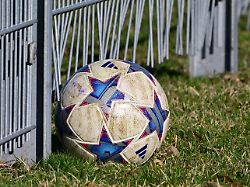“Aren’t they all angels”
Excesses of violence force amateur football to change the rules
March 13, 2024, 3:43 p.m
A knife attack, kicks to the head, and insults. A wave of violence causes games to be canceled in Bremen. Those responsible are forced to take drastic measures.
The shock in Bremen was deep. Bad insults, a kick in the head and a knife drawn: Because the violence in the amateur sector does not subside, the Bremen Football Association was forced to cancel all games planned for last weekend. A final straw to somehow calm the delicate situation.
“It wasn’t a punitive action,” said BFV President Patrick von Haacke: “It was a sign to stop and say: Come on, we’ll think about it.” But he couldn’t say what the hitherto unique action had achieved “in the end” and it would remain to be seen, said von Haacke: “But as a sign and memorial it was really good.”
And this seems to have been sorely necessary. Violence and discrimination on the sports field are not uncommon, not just in Bremen, but nationwide. “What we are seeing here are different dimensions. That has nothing to do with football at all,” emphasized von Haacke, who did not make the decision to cancel the event easy with his executive committee after various hate and violence incidents in different age groups. “They finally convinced me by saying: Patrick, what are you waiting for? For someone to be dead in the corner?”
An ideal world is utopian
Can general cancellations be the solution to the problem of violence? “I can say from experience: Where this remedy was taken, there were incidents afterwards. So it is not the panacea. It is certainly the last resort to make it clear to everyone what is at stake and that things cannot continue like this “, said DFB Vice-President Ronny Zimmermann: “But it would be wrong to expect that everything would be perfect afterwards.”
This hasn’t happened for years and the number of incidents remains at a consistently high level. The German Football Association is trying a lot to counteract this preventively. For Zimmermann, the problem goes beyond football. “Violence is part of our society. On a normal weekend we have between 50,000 and 65,000 games in German amateur football, i.e. several million people on the sports fields. They are not all angels. Football is a cross-section of society,” emphasized Zimmermann, who said But classifies football as “far safer than any concert or festival”: “Yes, violence is a problem in football. But the impression that there are always bangs in football is simply wrong in relation to the numbers.”
Cool-down phases as a countermeasure
Nevertheless, the topic remains omnipresent in amateur football. And dramatic individual cases always cause horror. The sad low point last year was the death of a 15-year-old who collapsed at an international youth soccer tournament in Frankfurt after being punched by a now-convicted opponent and later died.
A number of measures are intended to counteract the violence. One innovation is so-called cool-down breaks, which the referee can order in the event of escalations on or off the pitch. The game is interrupted until those involved have calmed down again. A central component of keeping violence, hatred and discrimination away from football pitches is close cooperation with the judicial authorities.
The Bavarian Football Association (BFV), for example, cooperates with the Munich Public Prosecutor’s Office. As a result, the BFV also forwards serious cases to the judiciary, regardless of the sports court’s processing. Haacke can also imagine such a cooperation: “We will definitely encourage it and want that.” And if none of that helps? Then, emphasized von Haacke, the BFV is not afraid of “harsh judgments” such as the exclusion of teams.
